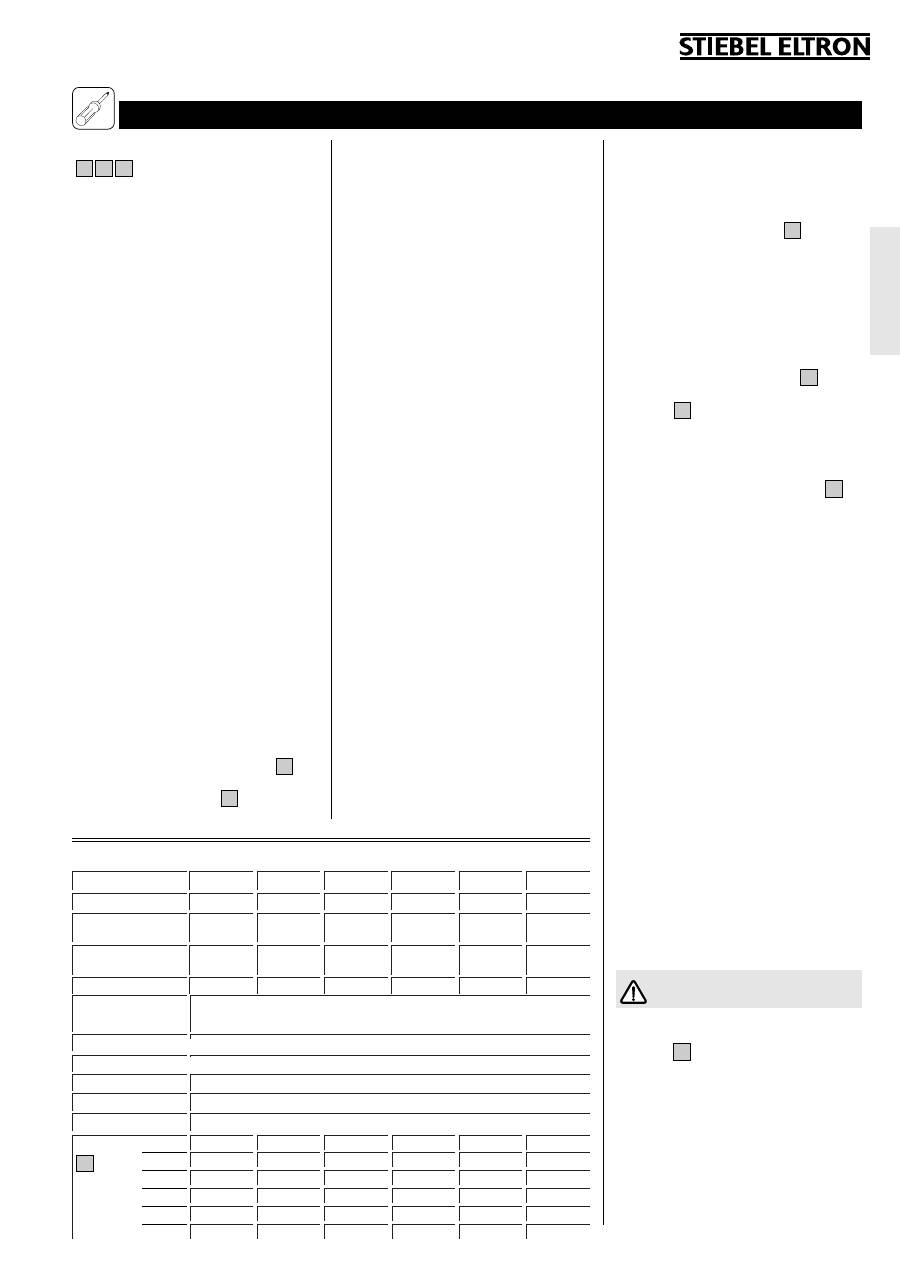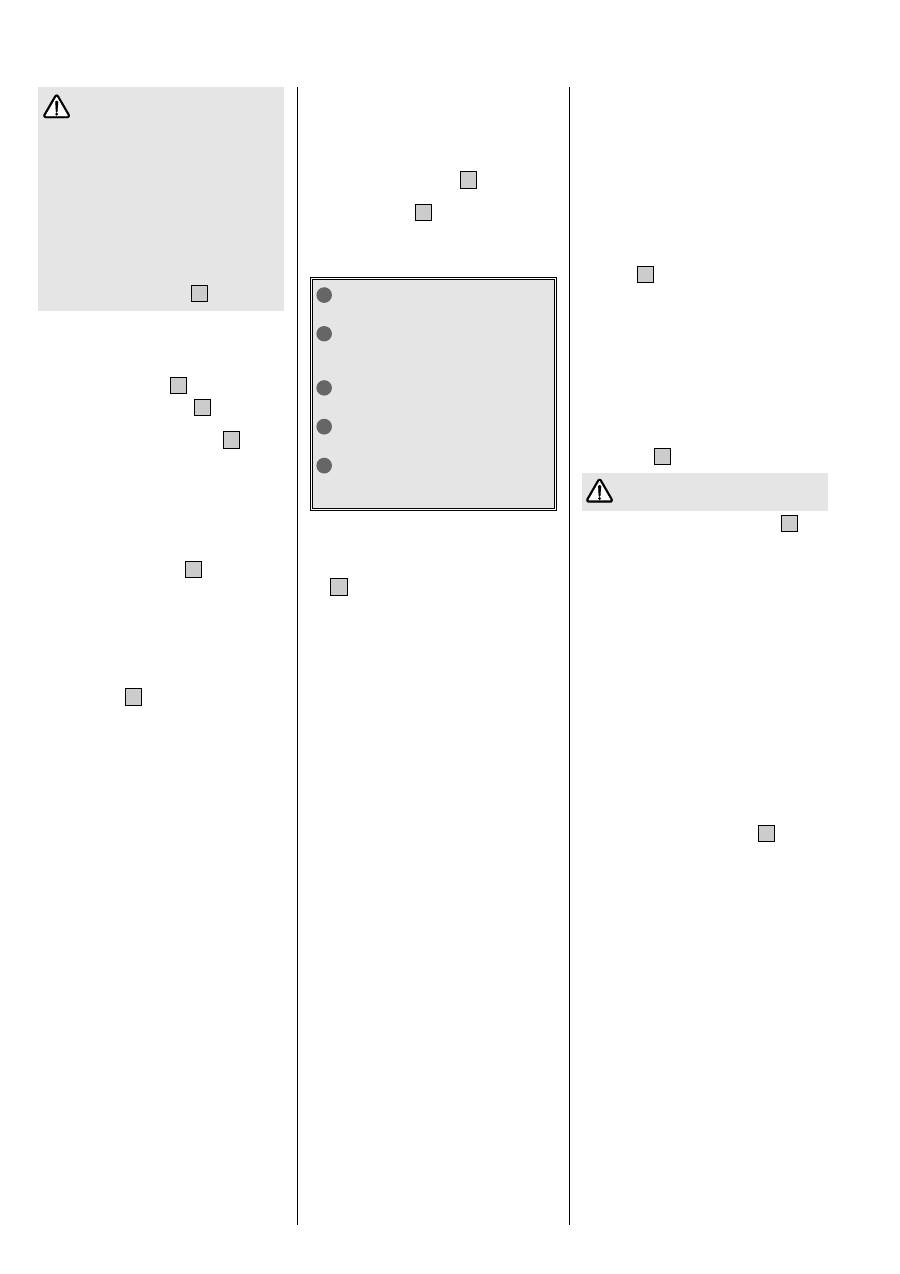Stiebel Eltron SH S electronic с 26.04.2004: 2. Installation instructions
2. Installation instructions: Stiebel Eltron SH S electronic с 26.04.2004

13
English
2. Installation instructions
for the qualified installer
2.1 Structure of the device
A
D
M
1
Temperature selection switch
2
Signal lamp for operating mode display
3
Lights for the heat content display
4
„SERVICE ANODE“ signal lamp
5
Operating panel
6
Hot water outlet nozzle G ½
7
Cold water inlet nozzle G ½
8
Inflow
9
Cable duct PG 21 for electrical
connection
10
Drain valve with hose connection G ¾
11
Pressure switch for signal anode
12
Reset button for safety temperature
limiter (actuation from the front)
13
Regulator-limiter combination
14
Seal
15
Cover caps
16
Signal anode
– SH 30 S (M 8):
Replace with heating element fitting
– SH 50 - 150 S (G 3/4):
Replace without heating element fitting
17
Heating element
18
Outflow pipe
19
Suspension bar top*
20
Suspension bar bottom*
(on SH 120 S and SH 150 S)
21
Thermostat
22
Safety temperature limiter
23
Pressure switch for signal anode
24
Heat content display
25
Plug distributor for N-lead
26
Terminal for power switchover
* For screws dia. 12 mm provided by
customer
2.2 Fittings
•
Unvented (pressurized) mode of opera-
tion:
Safety groups kV 30 or kV 40
F
.
•
Vented (pressureless) mode of operation:
Fittings without pressure
G
.
2.3 Regulations and
provisions
•
The installation (water and electrical
installation) and first start-up, as well as the
maintenance of this unit may only be
carried out by an approved specialist
installer in accordance with these
Instructions.
•
Perfect function and operational safety are
only guaranteed with original accessories
and spare parts intended for the unit.
y
The installation should be carried out in
accordance with the relevant water
(WRAS) and electrical (IEE) guidelines and
regulations.
y
Installation should be carried out in
accordance with the relevant water and
electricity supply companys regulations.
The following are also to be respected:
•
The unit rating plate
•
Technical data
•
Water installation
Pipe material:
– Cold water pipe
– Hot water pipe
Copper pipe
Copper pipe
Steel pipe
Steel or copper pipe
Plastic pipe systems
with the instantanous
water heater the operating temperature
can be adjusted upto max. 82 °C. The
maximum temperature can be limited to
65 °C. In case of failures temperatures can
rise up to 95 °C (max. 0.6 MPa).
The assigned plastic pipe system must be
appropriate for these conditions.
•
Electrical installation
– Electrical connection only with fixed-laid
leads in association with removable
cable bushings.
– The unit must be capable of all-pole
disconnection from the mains, for
example by fuses, with an isolating
distance of at least 3 mm.
2.5 Installation location
•
In an area not subject to the risk of
freezing.
•
Install close to the water tap.
2.6 Unit installation
E
•
Fit the suspension bracket.
Select the securing material to suit the
strength of the wall. With SH 120 S and
SH 150 S, two suspension brackets are
required.
Any unevenness in the wall is to be
compensated for by the spacer elements
provided (
a
. approx. 5 mm thick).
•
Install in a vertical position; see
D
.
•
Push the cover caps onto the suspension
bracket
E
(
b
).
2.7 Water connection
•
Unvented (pressurized) for the
supply of several draw-off points.
– Install the type-tested safety groups
F
KV 30, Order No. 00 08 26,
up to
0.48 MPa water pipe pressure
KV 40, Order No. 00 08 28,
up to 1 MPa
water pipe pressure
a
Safety valve
b
Backflow preventer
c
Test valve
d
Throughflow isolating valve (choke)
e
Pressure reducer (with KV 40)
f
Test nozzle for pressure gauge
g Thermostat fitting TA 260
Order No.
00 34 66
(order separately), also
possible in conjunction with
KV 40
.
– Establish dimensions for the outflow pipe
for a fully-opened safety valve. The drain
aperture of the safety valve must remain
open to the atmosphere.
– The drain for the safety group is to be
installed with a constant downwards
inclination.
– The information provided in the
Installation Instructions for the safety
group are to be respected.
– Set a maximum flow rate of 18 l/min at
the choke of the safety group.
•
Vented (pressureless) for the supply
of one single draw-off point
The units are suitable for vented
(pressureless) operation mode.
Do not block off the drain and
fittings pivot arm.
– With this installation the Stiebel Eltron
fittings for vented wall-mounted water
heaters
G
are to be used.
– Before connecting the fitting the water
pipe must be thoroughly flushed through.
– For use, installation, first start-up, and
maintenance, the same instructions apply
as for the operation of unvented
(pressurized) water heaters.
Instructions for „Signal anode in
unpressurized operating mode“
the page 14.
2.4 Technical data
(the data on the unit rating plate are applicable)
Type
SH 30 S
SH 50 S
SH 80 S
SH 100 S
SH 120 S
SH 150 S
Mixed water quantity l
59
97
159
198
235
292
40 °C (15 °C / 65 °C)
Capacity
l
30
50
80
100
120
150
Weight empty
kg
23,1
28,0
38,0
40,8
45,5
53,3
300
Connectable to power
1 - 4 kW
1/N/PE ~ 230 V
sources
3 - 4 kW
2/N/PE ~ 400 V
6 kW
3/N/PE ~ 400 V
Permissible operating pressure
0.6 MPa (6 bar)
Protection class EN 60529
IP 25 D
Test marking
See unit rating plate
Water connection
G ½ (external thread)
Flow rate
max. 18 l/min
Dimensions
a
mm
420
510
510
510
510
510
D
b
mm
410
510
510
510
510
510
h
mm
750
720
1030
1030
1190
1425
i
mm
–
–
–
–
300
k
mm
700
600
900
900
900
1100
l
mm
70
140
150
150
310
345
Table 1
0.45
0.52
0.66
0.77
0.92
1.05
Standby power
consumption / 24 h kWh

14
Instructions for „Signal anode in
unpressurized operating mode“
The display on the operating panel of the
signal anode for the pressurized water
heater provided as a standard fitting has no
function in the unpressurized operating
mode.
We recommend a conversion set with a
signal cartridge as display element in the
heating element space, Order No. 15 22 68.
The qualified installer can check the display
element of the signal anode after opening
the heating element space
L
.
2.8 Electrical connection
•
Remove the bottom cap from the device
by drawing off the regulator button and
removing the screws
H
.
•
electrical connection lead
I
.
•
Electrical circuit diagram
M
21
Thermostat
22
Safety temperature limiter
23
Pressure switch for signal anode
24
Heat content display
25
Plug distributor for N-lead
26
Terminal for power switchover
•
Connection variant
N
Connect the power rating required in
accordance with the connection example
and, if appropriate, replug the terminal
bridge (
26
).
2.9 Temperature selection
limitation
H
For:
– Greater safety against scalding
– Less energy consumption
– Less limescale formation
the temperature can be limited.
a
Adjustment possibility of the
temperature limitation
b
Customer to prepare position for
2.10 Installation conclusion
•
Mark the connection power and
voltage on the device rating plate with
a ball-point pen.
•
Place the bottom flap in position and
secure it with screws
H
.
•
Press the temperature selector button
into position
H
.
2.11 First start-up
(may only be
carried out by a qualified installer)
1
2
3
4
5
6
7
8
10
11
12
13
14
15
16
17
18
19
20
21
22
23
24
9
Fill the unit, deaerate it, and
flush it through thoroughly!
1
2
3
4
5
6
7
8
10
11
12
13
14
15
16
17
18
19
20
21
22
23
24
9
Turn temperature selector
switch to the right as far as the
stop!
1
2
3
4
5
6
7
8
10
11
12
13
14
15
16
17
18
19
20
21
22
23
24
9
Switch on mains electricity
supply!
1
2
3
4
5
6
7
8
10
11
12
13
14
15
16
17
18
19
20
21
22
23
24
9
Check the operation of the
appliance!
1
2
3
4
5
6
7
8
10
11
12
13
14
15
16
17
18
19
20
21
22
23
24
9
Check the safety group for
functional performance
(in the
case of unvented operating mode)!
Delivery status:
•
At temperatures of below - 15 ºC (e.g.
transportation/storage) the safety thermal
cut-out may trip. Press the reset button
(
D
12
).
Handing over the unit:
Explain the function of the unit to the users
and familiarise them with its use.
Important notes:
•
Advise the users about possible hazards
(such as scalding).
•
Hand over these Operating and Installation
Instructions for safekeeping. All the
information provided in these Instructions
must be followed carefully. These
Instructions provide details about safety,
operation, installation, and the
maintenance of the unit.
2.12 Maintenance
•
When carrying out any work, disconnect
all poles from the mains supply.
•
Check the safety group regularly.
•
Descale the element only after
dismantling. Do not treat the reservoir
surface and parasitic current anode with
descaling agents.
•
Safety device:
Regulator-limiter combination immersion
depths
K
:
a -
Limiter sensor
b
- Regulator sensor
•
Draining the storage water heater
cylinder: Before draining the cylinder,
disconnect the unit from the mains supply.
– Close the isolating valve in the cold
water feed line.
– Open the hot water fittings fully at all
draw-off points.
– Unscrew the cap from the drainage
nozzle (
D
10
).
Hot water may come out during
draining.
•
The corrosion protection resistor
J
on
the insulating plate must not be damaged
or removed during servicing work. When
replacing the corrosion protection resistor
the assembly is to be re-established in the
correct manner.
a
Copper heating element
b
Insulating plate
c
Pressure plate
d
Corrosion protection resistor
•
Check the
signal anode
and replace it as
soon as the „SERVICE ANODE“ signal
lamp on the operating panel lights up.
When replacing the anode, it is essential
for the pressure switch to be screwed in
tight.
In unpressurized operating mode, the
signal cartridge is to be checked (see also
2.7, Water Connection, „Signal anode
instructions“). If the cartridge
L
is
showing a red colour, the anode should
be checked and replaced if necessary.
Tightening torque: 1
+0.5
Nm (finger-tight).
Оглавление
- 1. Gebrauchsanweisung
- 2. Montageanweisung
- 5.Umwelt und Recycling 3. Störungsbeseitigung
- Notizen
- 4. Kundendienst und Garantie
- 1. Operating instructions
- 2. Installation instructions
- 4. Fault rectification
- 1. Notice d’utilisation
- 2. Instructions de monta
- 3. Dépannage
- 1. Gebruiksaanwijzing
- 2. Montagehandleiding
- 3. Het verhelpen van storingen
- 3. Odstraňování

